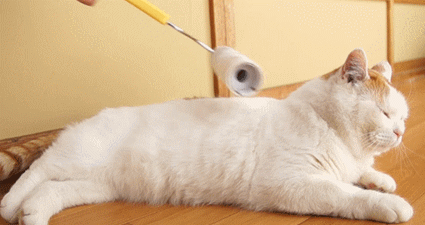Can a cat’s saliva really disinfect? Have you ever noticed that, even as an experienced cat owner, some “common misconceptions” about cats are still deeply ingrained in many people’s minds? Some of these serious misconceptions can even lead to a cat’s death! After thorough research and long-term observation, “Cute Paw” has compiled the five most widespread misconceptions about cats. Take a look and see how many of these you’ve fallen for:
-
Cats Have Nine Lives
This common misconception has unfortunately led to the death of countless innocent kittens! One example is a controversial and cruel experiment conducted by an Australian scientist named Karl Kruzelnisk, who sought to prove the idea that “cats never die from falling from heights.” He dropped 150 cats, all over five months old, from different floors of a 32-story building in New York City. In this gruesome experiment, 10% of the cats died instantly. After analyzing the data, Kruzelnisk found that those cats who fell from the 7th or 8th floor (mid-to-low levels) were the ones that died. Cats have an incredible “righting reflex” that allows them to rotate their bodies and adjust their position as they fall, ensuring they land feet first. This reflex, combined with their internal balance system, makes them surprisingly resilient to certain falls. However, even though cats can survive higher falls due to this reflex, falling from any height still causes severe injuries and can be fatal. With the rise of short-video platforms, some reckless individuals have placed their cats on narrow ledges of tall buildings, thinking that they won’t get hurt. Sadly, one such cat fell from the 32nd floor and tragically died. This myth of “cats having nine lives” is harmful. Cats can suffer serious internal injuries, broken bones, and even internal bleeding from high falls. While it may seem that some cats survive high falls, it’s more about luck than any miraculous power. And most importantly, there’s no such thing as “nine lives”—it’s all about careful care from their owners.
-
Cat Saliva Can Disinfect Wounds
This is a completely false claim. Many people, believing this myth, fail to properly disinfect their cat’s wounds and let them lick the injury, which worsens the situation. While cat saliva does contain a small amount of lysozyme, an enzyme that can fight bacteria, it’s nowhere near enough to act as a disinfectant. In fact, cat saliva is full of bacteria, and letting a cat lick a wound can easily cause an infection, worsening the injury and potentially leading to further complications. If your cat is injured, it’s important to use proper disinfectants like iodine and ensure they wear an Elizabethan collar to prevent licking. In serious cases, seek veterinary care immediately.

-
Cats Can’t Be Tamed
Many people think cats are inherently aloof and can never bond with humans. They believe that unlike dogs, who are known for their loyalty, cats simply won’t form strong attachments. However, this isn’t true. Cats are solitary animals by nature and were domesticated much later than dogs, making them less inclined to seek constant affection. A study conducted by researchers at the University of Oregon involved isolating 50 cats from their owners for several hours, without food or toys. When reunited, the majority of cats (over 50%) chose their owners over food or toys. Despite being independent, cats are capable of forming deep attachments to their owners. Recently, there was a touching story of an elderly cat who suddenly began showing affection towards its owner, nuzzling and pawing at their hand before passing away. Cats express love in subtle ways, and understanding these gestures can reveal just how much they depend on and love their owners.
-
Owning a Cat is Dirty
This misconception usually comes from people who haven’t owned cats or are considering adopting one. “Cat owners” often get blamed for having dirty homes, primarily due to the cat hair that tends to spread everywhere—on the bed, in food, and even in drinks. Some people exaggerate, claiming cat hair can even get into your lungs. However, this is far from the truth. Cats are fastidious groomers and spend a lot of time cleaning themselves. Even if you never bathe your cat, it will likely stay clean and odor-free. It’s true that cats shed hair, but this is not an issue unless a cat is overweight or not groomed regularly. When it comes to parasites like fleas, as long as you regularly deworm your cat, there’s no need to worry. Cats are generally much cleaner than many people assume.
-
Owning a Black Cat is Bad Luck
In fact, according to traditional Chinese culture, owning a black cat is actually considered lucky! The idea that black cats are unlucky comes from medieval European superstitions, where they were believed to be witches’ familiars or even demons. People thought seeing or touching a black cat would bring misfortune or death. This belief has no scientific basis and is rooted in outdated folklore. In contrast, Chinese culture views black cats as symbols of protection, capable of warding off evil spirits and bringing good fortune. Historically, wealthy families in China would keep black cats or display black cat figurines to ward off bad luck and ensure safety.
In fact, all cats are equally adorable, no matter the color. Once you choose to adopt a cat, never abandon them for any reason, and don’t fall for superstitions or rumors. It’s important to commit to scientifically informed care and to be there for them throughout their lives. If you found this article interesting, don’t forget to share it with fellow cat owners!





